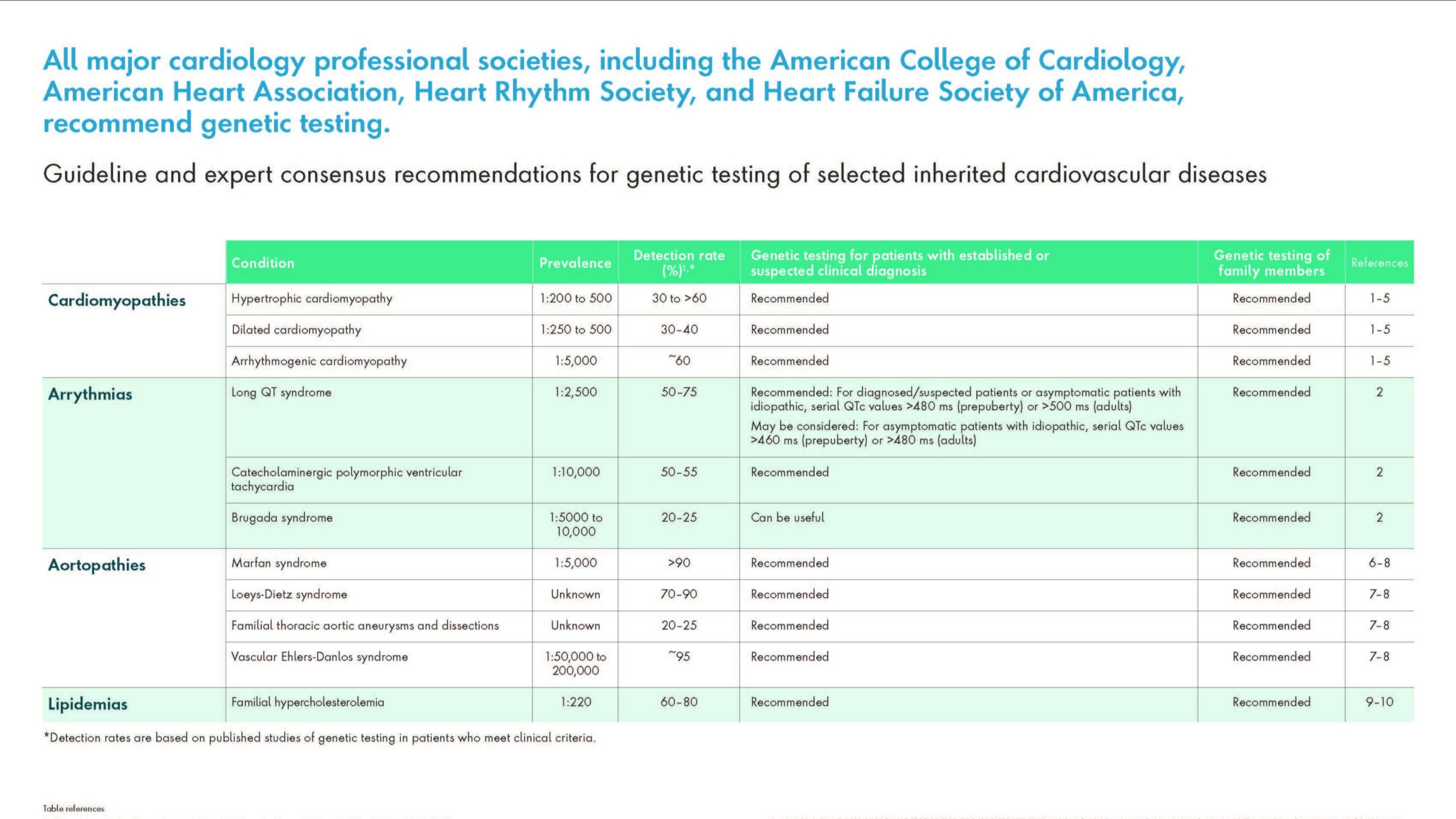The Hereditary Cardiac Assessment analyzes 73 genes that are known to be associated with the onset of cardiac related diseases. Analysis from this test has shown that 1 out of every 200 people who get tested have a pathogenic variance (gene mutation).
Hereditary Cardiac Assessment
Physician Benefits:
- Identifies diagnostic needs from existing patient base such as ultra sound, stress tests and other diagnostic tests.
- Early diagnosis and detection intended to improve patient care and decrease re-admission rates.
- Impact on Merit Based Incentive Payment System (MIPS) scores.
- Medicare Part B provides coverage at no cost to the patient.
Lab Provides:
- Training related to specimen collection and requisition completion.
- Establishment of medical necessity.
- Identification of eligible patients.
- Genetic counselors review results with patient after consent with physician.
- Treatment plan sent to physician if requested.
- Access to genetic counselors as needed.
AHA SCIENTIFIC STATEMENT
Genetic Testing for Inherited Cardiovascular Diseases
A Scientific Statement From the American Heart Association
Abstract:
Advances in human genetics are improving the understanding of a variety of inherited cardiovascular diseases, including cardiomyopathies, arrhythmic disorders, vascular disorders, and lipid disorders such as familial hypercholesterolemia.
“Interpreting and Acting on the Genetic Testing Results,” and the implications of the results of genetic testing not just for the patient’s own health but also for the health of family members who might share genetic variants predisposing to inherited cardiovascular disease”
The American Heart Association has called for enhancing genetic knowledge among cardiovascular healthcare professionals by incorporating case-based genetics and genomic medicine educational curricula in fellowship training programs.66 CVGPs are ideally suited training environments to contribute to satisfying these needs, for both individuals in training programs and individuals in independent practice who provide care to patients with heritable CVDs.
Genetic testing has evolved significantly and is essential in the management of most patients with heritable CVDs. Several organizations have published guidelines recommending genetic testing for patients with heritable CVD.24,69,79 Genetic testing can aid in establishing a specific, etiologically based diagnosis and can impact clinical management strategies, including therapeutic recommendations and risk-reduction approaches.
The genetics community endorsed GINA, which was signed into US federal law in 2008.97 This important legislation provides protection from discrimination based on genetic test results in the 2 key areas of employment and health insurance.
Cardiovascular genetics is a rapidly evolving subdiscipline within cardiovascular medicine, and its growth is attributed to advances in DNA sequencing, wider availability of genetic testing, and the expanding understanding of the genetic basis of multiple cardiac conditions, including arrhythmia disorders, heart failure, lipid disorders, and vascular disease, including aortopathies. There have also been enormous strides in genetic diagnostic techniques, which have lowered costs and improved accessibility.
FAQs
How many genes does the Genetic Cardiac Assessment Screen for?
The hereditary cardiac assessment analyzes 73 genes that are known to be associated with the onset of cardiac related diseases. Analysis from this test has shown that 30% of all patients who get tested have a pathogenic variance (gene mutation).
How do I give you a DNA sample?
We send you a simple cheek swab kit with instructions at no cost to you. Once administered, you simple return sample in the paid return packaging we provide so our lab can perform the test and get your results delivered.
Where is the test performed?
The test is performed onsite at Nexus Genetics Laboratories because it requires specialized equipment and expertise. Individual molecular tests are, however, becoming increasingly available in some healthcare practitioners’ offices.
What happens after I get my results?
After your results are processed by our lab, they will be sent securely by email to you and your doctor. Your doctor will be able to advise you on any additional therapies, screenings or specialists that may be needed for further clinical support.
How long does it take to get the results delivered?
Test results will be delivered within 10-14 days once your sample has been received at our lab. Results may be delivered sooner based on the number of tests within our system at the time when we receive your sample.
How is genetic testing regulated?
US laboratories that perform genetic testing are regulated under the Clinical Lab Improvement Amendments (CLIA) program. Laboratories that are certified under CLIA are required to meet federal standards for quality, accuracy, and reliability when conducting medical testing. Nexus Laboratories is a CLIA certified laboratory and meets all the requirements to run these screenings.
Does Nexus Laboratories have certifications?
Nexus is a CLIA certified laboratory and registered with CMS, which regulates all laboratory testing on humans. Our laboratory is also accredited from COLA, an independent accreditor on laboratory education and clinical standards. All of our staff is HIPAA trained and certified.
Where is Nexus Laboratories located?
Nexus Laboratories is located in Dallas, Texas, and has been in business there for over 10 years focused on a wide range of testing including genetics, toxicology, respiratory, and COVID-19.


